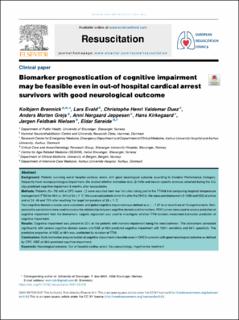| dc.contributor.author | Brønnick, Kolbjørn Kallesten | |
| dc.contributor.author | Evald, Lars | |
| dc.contributor.author | Duez, Christophe Henri Valdemar | |
| dc.contributor.author | Grejs, Anders Morten | |
| dc.contributor.author | Jeppesen, Anni Nørgaard | |
| dc.contributor.author | Kirkegaard, Hans | |
| dc.contributor.author | Nielsen, Jørgen Feldbæk | |
| dc.contributor.author | Søreide, Eldar | |
| dc.date.accessioned | 2021-08-12T09:13:32Z | |
| dc.date.available | 2021-08-12T09:13:32Z | |
| dc.date.created | 2021-07-19T17:11:25Z | |
| dc.date.issued | 2021-02 | |
| dc.identifier.citation | Brønnick, K., Evald, L., Duez, C.H.V. et al. (2021) Biomarker prognostication of cognitive impairment may be feasible even in out-of hospital cardical arrest survivors with good neurological outcome. Resuscitation, 162 | en_US |
| dc.identifier.issn | 0300-9572 | |
| dc.identifier.uri | https://hdl.handle.net/11250/2767519 | |
| dc.description.abstract | Background
Patients surviving out-of hospital cardicac arrest, with good neurological outcome according to Cerebral Performance Category, frequently have neuropsychological impairment. We studied whether biomarker data (S-100b and neuron-specific enolase) obtained during the ICU stay predicted cognitive impairment 6 months after resuscitation.
Methods
Patients (N = 79) with a CPC-score ≤2 were recruited from two trial sites taking part in the TTH48 trial comparing targeted temperature management (TTM) for 48 h vs. 24 h at 33 ± 1 °C. We assessed patients 6 months after the OHCA. We measured biomarkers S-100b and NSE at arrival and at 24, 48 and 72 h after reaching the target temperature of 33 ± 1 °C.
Four cognitive domain z-scores were calculated, and global cognitive impairment was defined as z < −1.67 on at least 3 out of 13 cognitive tests. Non-parametric correlations were used to assess the relationship between cognitive domain and biomarkers. ROC curves were used to assess prediction of cognitive impairment from the biomarkers. Logistic regression was used to investigate whether TTM duration moderated biomarker prediction of cognitive impairment.
Results
Cognitive impairment was present in 22% of the patients with memory impairment being the most common. The biomarkers correlated significantly with several cognitive domain scores and NSE at 48 h predicted cognitive impairment with 100% sensitivity and 56% specificity. The predictive properties of NSE at 48 h was unaffected by duration of TTM.
Conclusions
Early biomarker prognostication of cognitive impairment is feasible even in OHCA survivors with good neurological outcome as defined by CPC. NSE at 48 h predicted cognitive impairment. | en_US |
| dc.language.iso | eng | en_US |
| dc.publisher | Elsevier Ltd. | en_US |
| dc.rights | Navngivelse 4.0 Internasjonal | * |
| dc.rights.uri | http://creativecommons.org/licenses/by/4.0/deed.no | * |
| dc.subject | hjerteinfarkt | en_US |
| dc.subject | nevropsykologi | en_US |
| dc.subject | hypotermisk behandling | en_US |
| dc.title | Biomarker prognostication of cognitive impairment may be feasible even in out-of hospital cardical arrest survivors with good neurological outcome | en_US |
| dc.type | Peer reviewed | en_US |
| dc.type | Journal article | en_US |
| dc.description.version | publishedVersion | en_US |
| dc.rights.holder | © 2021 TheAuthor(s) | en_US |
| dc.subject.nsi | VDP::Medisinske Fag: 700::Klinisk medisinske fag: 750 | en_US |
| dc.source.pagenumber | 1-7 | en_US |
| dc.source.volume | 162 | en_US |
| dc.source.journal | Resuscitation | en_US |
| dc.identifier.doi | 10.1016/j.resuscitation.2021.02.025 | |
| dc.identifier.cristin | 1922119 | |
| cristin.ispublished | true | |
| cristin.fulltext | original | |
| cristin.qualitycode | 2 | |

